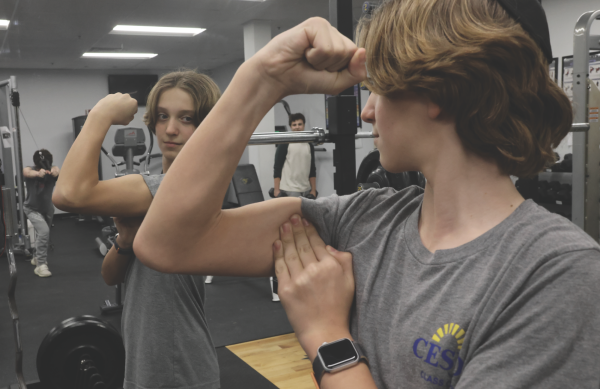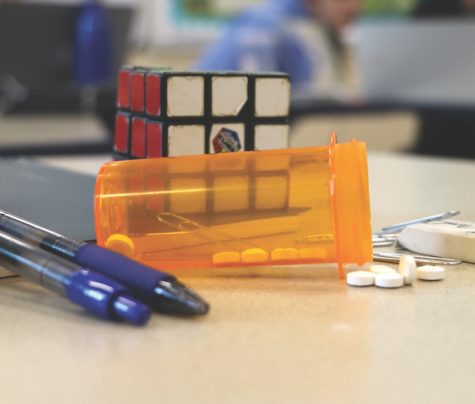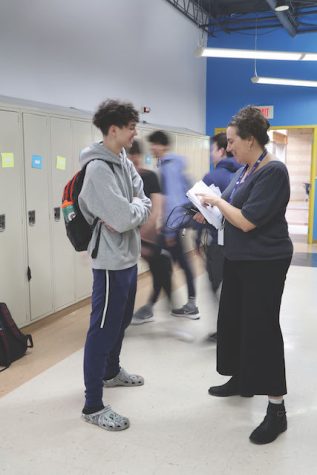Not Enough Time: A look into the importance of sleep and why it’s so hard to get
September 10, 2020
Many students at CESJDS struggle to get a healthy amount of sleep on a nightly basis. Several factors can contribute to this including extracurriculars, procrastination, an overload of work on a single night or prioritizing work over sleep.
Importance of Sleep
According to pediatrician and JDS parent Dr. Joanna Sexter, lack of sleep can make it difficult to concentrate, disturbs students’ executive functions and their judgment, impairs students’ ability to regulate emotions and makes teens more defiant. All these factors can affect both a student’s academic performance and emotional health.
The recommended amount of sleep for teens is eight to 10 hours per night, according to Sexter. After school naps, however, can help make up for missed sleep the night before, but naps over 30 minutes can leave people feeling groggy and unalert. Sexter additionally notes that it is important to maintain your circadian rhythm, which, according to the National Institute of General Medical Sciences, is the physical, mental and behavioral patterns that individuals follow through a daily cycle, like sleeping at certain times in a day.
“We know that your circadian rhythms do better when you actually go to bed at the same time and wake-up at the same time, even on weekends,” Sexter said. “Obviously that is not always possible, but in an ideal world, sticking to the same schedule is really helpful.”
In order to have the best sleep hygiene, Sexter recommends that caffeine and electronics be avoided before bed. Exercise can also be very helpful for improving the duration of sleep and a person’s ability to fall asleep faster.
School’s Role in Promoting Balance
The JDS administration monitors the amount of homework students are assigned to ensure their workload is not too large. The academic council, which consists of the middle school principal, high school principal, all department chairs, the director of college guidance and other faculty members, adjusts the curriculum and tries to standardize the workload and difficulty level for each teacher and class.
“Students may not see it this way, [but] we have done some research on how much homework our school gives relative to how much other schools give, and we’re actually not a heavy homework school relative to other high schools,” Head of School Rabbi Mitch Malkus said. “One thing that we have learned a lot when we have surveyed students and talked to students is that it takes different students different amounts of time to do the same kind of homework. So what we are shooting for is the general average amount.”
In order to help manage student stress, guidance counselors have meetings with freshmen twice a year to check in and see how they are doing regarding many issues, including time management. The administration and the guidance counselors also have established guidelines to help decrease the workload of students.
According to the High School Handbook, students are given one extension pass per class that they are allowed to use on any assignment, project or test unless otherwise noted by teachers ahead of time, which was implemented in 2012. Similarly, students are only allowed two tests or essays due per day and five per week. If they are assigned more than that, students are allowed to push back each excess assessment without using an extension pass.
“I get very frustrated when a really exhausted student tells me they had four tests in one day. When I ask why they took four tests in one day when the limit is two, they say that they don’t like to postpone things,” Interim High School Principal and Dean of Students Roslyn Landy said. “The guidelines and policies were put in place to help students, but they have to avail themselves of these safety nets.”
Although these guidelines are intended to help mitigate stress and promote healthier sleep schedules, some students avoid using extension passes to save them for later in the school year, and stay up late on assignments even if it reduces the amount of sleep they have. A survey sent out to sophomores, juniors and seniors showed that 51.2% of students did not use any extension passes in the 2019-2020 school year, while the remainder used one to two.
“I believe in getting my work done when I receive it because that way I can just get itout of the way,” sophomore Elliot Bramson said, who did not use any extension passes in his first year of high school.
The administration has considered adjusting school start times to in-person learning to help students increase their focus, but they believe that this is not possible for many reasons.
“The school is aware that there has been some research on teenagers and what are their brain patterns and what times of days would be better for learning and how much sleep teenagers need to get,” Malkus said. “That being said, it is very hard because of the world that we live in and parents’ schedules and also other school activities to have the day align with that.”
While the start time likely won’t change, the administration has adjusted the in-person schedule to allow students to get more sleep. In 2000, they switched from having nine classes per day to only having six to decrease the amount of homework assigned in a single night.
The administration also placed Zman Kodesh in the very beginning of the day to allow time for mindfulness before students jump into learning and academic classes, a policy that will continue during online learning in the 2020-2021 school year.
“You can only educate and try to create the best environment possible, and then you try to have students make the right decision,” Sexter said.
Procrastination/Mental Health
Many students at JDS find it difficult to focus on work which results in procrastination. However, working closer to deadlines often means that students must decide between work and sleep.
“I do [procrastinate],” junior Naomi Gould said. “I find when I am more stressed it is really difficult for me to have the headspace for me to get all my work done in a row. Especially taking nine advanced academic classes, I have a really intense workload which just leads me to procrastinate more.”
Landy acknowledges that students generally do not get enough sleep and often put their grades before their sleep hygiene.
“I would be very happy if students could put their health above getting an “A;” they need to consider their physical and mental health,” Landy said.
High school guidance counselor Rachel Soifer works with students to help them manage their time and understand that there are different forms of procrastination. A student could put off work because the content is overwhelming, they are having a difficult time with focus and attention, they have an undiagnosed learning issue or there is a need for academic support.
“We want to see that kids are able to effectively perform at school in a way that aligns with their ability,” Soifer said.
When there are recognizable procrastination issues that become a pattern, Soifer hopes that the students themselves will bring it to their attention and ask for help. However, if a student does not bring this to the guidance counselor’s attention, parents and teachers step in.
“I like to help students find ways that they can take ownership and tell their parents and tell their other supports in their life, like their teachers or counselors or study hall teachers, what it is that they need to succeed and how others can support them,” Soifer said.
Sleep culture
Deciding whether to go to bed or stay up late to study or finish one’s work can be a difficult decision.
According to a survey completed by 85 JDS high school students, 51.2% value finishing homework and sleeping equally while 35.7% value finishing homework more than their sleep.
Senior Tali Kuperberg values her schoolwork more than her time sleeping. On a good night for Kuperberg, she generally gets five to six hours of sleep during in-person learning.
“I guess I value doing well in school over sleep because I’d rather stay up studying. Once I stayed up studying till two in the morning for a test, and that was great because then I did great on the test,” Kuperberg said.
When guidance counselors meet with their students every year, guidance directly raises the question of health and a balanced sleep schedule.
“[Students] can easily talk about how they value sleep. It’s not just me talking at them or to them about it and I would say that kids, in general, are very conscious of their sleep schedules,” Soifer said.
Over the past few years, Soifer has noticed that students have become more conscious of how much sleep is a healthy amount for them on a daily night and able to acknowledge when they need to change their schedule.
“I do think there’s been a culture shift and students are more self-aware and conscious and more deliberate about paying attention to their sleep,” Soifer said.
When in the school building, Community Time gives students the opportunity to meet with teachers, study for an assessment, do some school work, or take a break and have some free time. Students have the choice to use this time as they wish. During distance learning, time is built into the school day for office hours for students to meet with teachers and get help virtually.
Senior Jake Rulnick sometimes works during lunch or Community Time with the aim of not compromising his sleep time.
“I really try to get all my homework done and if I have to do it during lunch or Community Time or something like that I just try to really make sure I get it done, and if I’m still doing work at around 10 p.m., I try to wrap it up and just go to bed because then I’m not going to be productive if I don’t sleep enough,” Rulnick said.
Sleep during distance learning
For many students, the switch from in-person learning to distance learning had a significant impact on the amount of sleep they get on a school day.
During the portion of the 2019-2020 school year that took place online, classes started at 10 a.m. and Zman Kodesh was optional. Students like Gould felt that the later wake up times helped her get more sleep and work better with her circadian rhythm.
“During distance learning [in the spring] I felt the school actually did a really good job of making sure we weren’t too overwhelmed with both everything happening in the world and school so I didn’t feel like I had to procrastinate as much … I actually felt that [procrastination] was less of an issue during distance learning than it was during the school year,” Gould said.
The new schedule for online learning, however, has mandatory Zman Kodesh starting at 8:35 a.m., which some students worry may be too early.
“It’s a little bit concerning that given mandatory Zman Kodesh now the school day will be starting an hour and a half earlier,” Gould said. “I definitely agree that yes, it could be starting a little bit earlier than 10 a.m. That was very generous, but I’m nervous that especially because I’ve gotten so used to going to bed later and waking up later and that’s just what works for me that I’ll have to readjust and then I’ll just be getting less sleep in general.”

















